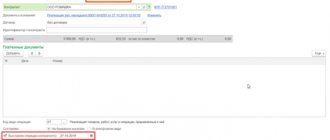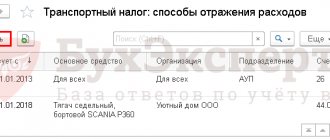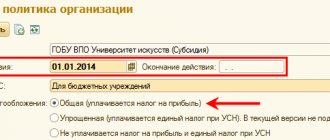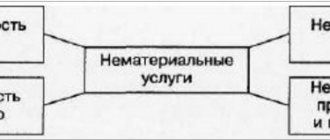Learn about the secrets of filling out a standard document Adjusting the implementation of the operation type Correction in primary documents .
This article will help you understand how to correct documents and errors in 1C 8.3, incl. how to fix:
- implementation of the past and current periods in accounting;
- income tax errors;
- VAT errors, incl. issue corrective invoices;
- postings when a standard document makes incorrect entries.
- Creating and filling out a document
- Algorithm for correcting errors in control units
- Algorithm for correcting errors in NU
- Algorithm for correcting VAT errors
Creating and filling out a document
Document Implementation Adjustment
Implementation Adjustment document is used for:
- correction of errors in primary documents for the implementation of goods and materials, works, services (GWS);
- adjustments to the amount or quantity of goods, works, services sold as agreed by the parties, incl. processing the return of goods from the buyer.
Types of operations:
- Adjustment by agreement of the parties : an adjustment invoice is issued;
- a corrective invoice is issued.
The main ways to create an Implementation Adjustment :
- based on documents by clicking the Create button based on : Sales (act, invoice);
- Implementation adjustments;
- Provision of production services;
- Report of the commission agent (agent) on the sale of x;
- Return of goods from the buyer;
- Sales – Sales adjustments.
Filling features:
- Correction No. from - data of the corrected document;
- Basis – the document being corrected or corrected;
- Reflect the adjustment - where changes are made: In all sections of accounting - postings are generated for accounting, NU and movements in VAT registers;
- Only in VAT accounting – only movements in VAT registers are generated;
- Only in printed form - postings and movements are not generated;
The error is corrected according to the accounting accounts:
- reversal entries or
- additional entries.
Let's look at how to correct errors in accounting (correcting documents and postings), tax accounting (income tax), and VAT in 1C 8.3: registering a corrected invoice.
Decrease
Let us now assume that in March Beta LLC signed a certificate of completion of work with Pixel LLC in the amount of 24,000 rubles, including VAT, for installation and configuration of new software. In April, the installed software experienced malfunctions. The examination identified a fatal software defect. Pixel LLC fully agreed with the claim received from the counterparty and in February returned the money to Beta LLC. This transaction is reflected in the accounts of both companies. 24000 / 1.2 = 20000 rub. 24000-20000 = 4000 rub.
Pixel LLC (service provider)
March:
- Dt 62 Kt 90-1 24,000 rub. – revenue accrued (including VAT).
- Dt 90-3 Kt 68 4000 rub. – VAT has been charged.
- Dt 51 Kt 62 24,000 rub. – payment from Beta LLC according to the work completion certificate.
April (1st quarter data adjustment):
- Dt 91-2 Kt 62 20,000 rub. – loss, decrease in sales.
- Dt 68 Kt 62 4000 rub. – VAT reduction.
- Dt 62 Kt 51 24000 – return of previously transferred funds to Beta LLC.
In this case, it is also possible to post Dt 91-2 Kt 62 RUB 24,000. – the decrease is reflected together with VAT, Dt 68 Kt 91-1 4000 rub. – VAT is allocated on this amount, a tax deduction based on the adjustment invoice. However, the instructions for the chart of accounts do not indicate the connection of 91 accounts with VAT. At the same time, the accounting meaning of accounts 90 and 91 is certainly similar.
Beta LLC
March:
- Dt 20, 26 Kt 60 20,000 rub. – the cost of installing the software is included in the price.
- Dt 19 Kt 60 4000 rub.
- Dt 68 Kt 19 4000 rub. – VAT has been taken into account and accepted for deduction.
- Dt 60 Kt 51 RUB 24,000 – payment for the work of Pixel LLC.
April:
- Dt 76/2 (since there was a claim) Kt 91/1 20,000 rub. – other income is recorded.
- Dt 76/2 Kt 68 4000 rub. – VAT restoration for settlements with Pixel LLC.
- Dt 51 Kt 76/2 24,000 rub. – refund from Pixel LLC.
Algorithm for correcting errors in control units
Learn more about correcting accounting errors
Errors of the current year identified before the end of the reporting year
According to the 1C algorithm, corrections are made to the control system during the error detection period (clause 5 of PBU 22/2010):
- There is no need to open the “closed” period, because postings in accounting will be generated by the date the error was discovered: in correspondence with accounts and subaccounts, which are indicated on the Products/Services - as in the primary document;
Read more Workshop on correcting current year errors in accounting records
Errors from previous years identified before signing the reports
According to the 1C algorithm, adjustments to the sales of the previous period are made to the accounting system in December (clause 6 of PBU 22/2010):
- it is necessary to open a “closed” period, because postings to accounting will be generated on December 31;
- Calculations tab - the Last year's accounting checkbox is closed from adjustment (reporting is signed) is not checked: in correspondence with accounts and sub-accounts indicated on the Products/Services - as in the primary document;
- Dt 90.09 Kt 99.01.1 – financial result of the adjustment.
Postings to accounting will be made in a “closed” period, but the sequence boundary is not violated - a feature of the Implementation Adjustment document.
In this case, the balance will appear in the accounting system in subaccounts 90 (91) and account 99, which needs to be closed:
- run Balance Sheet Reformation in the Month Closing for December last year.
Accounting statements need to be reformatted. The error will be reflected on the same lines as the income/expenses of the operation.
Read more Workshop on correcting an error in accounting from last year that was identified before the reporting was signed
Minor errors from previous years identified after signing the financial statements
According to the 1C algorithm, adjustments to the implementation of the previous period are carried out as for minor errors in the error detection period through 91 accounts (clause 14 of PBU 22/2010):
- There is no need to open the “closed” period, because entries in the accounting system will be generated by the date the error was detected.
- Calculations tab - the Last year's accounting checkbox is closed from adjustment (reporting is signed) is selected: in correspondence with account 91;
- subconto to account 91 – Item of other income and expenses, is substituted by default.
Significant errors of previous years identified before the date of submission of financial statements or the date of approval of financial statements
There is no algorithm for correcting last year’s 1C 8.3, but the principle of correction is the same as for last year’s errors identified before signing the reports:
- it is necessary to open a “closed” period, since transactions in accounting will be generated on December 31;
- Calculations tab - the Last year's accounting checkbox is closed from adjustment (the reporting is signed) is not checked: in correspondence with accounts and sub-accounts indicated on the Products/Services - as in the primary document:
- Dt 90.09 Kt 99.01.1 – financial result of the adjustment.
Postings to accounting will be made in a “closed” period, but the sequence boundary is not violated - a feature of the Implementation Adjustment document.
In this case, the balance will appear in the accounting system in subaccounts 90 (91) and account 99, which needs to be closed:
- run Balance Sheet Reformation in the Month Closing for December last year.
Generate a corrected copy of the financial statements and present it to all users. The error will be reflected on the same lines as the income (expenses) for the operation.
Significant errors from previous years identified after the statements were approved
There is no algorithm for correcting such errors in 1C, but you can use a mechanism to correct Minor errors from last year that were identified after signing the reports.
According to the 1C algorithm, last year’s adjustment is carried out only through 91 accounts, and in this situation the correction must be made through 84 accounts (clause 9 of PBU 22/2010):
- There is no need to open the “closed” period, because entries in the accounting system will be generated by the date the error was detected.
- Calculations tab - the Last year's accounting checkbox is closed from adjustment (reporting has been signed) is checked;
- in the transactions of the document Adjustment of sales, select the checkbox Manual adjustment : change correspondence with account 91 to account 84 only in accounting on the date the error was identified;
The date changes only for posting income/expenses to accounting!
- in the current financial statements, retrospectively adjust manually the opening balances for the changed accounts as of December 31.
Or, to correct a significant error through invoice 84, you can use the document Transaction entered manually.
But! It is better to make a decision depending on the necessary amendments to taxation and VAT.
Definition
A downward or upward adjustment to the sales of the previous period (CSF) may arise as a result of:
- Changes in the cost of work.
- If it is necessary to adjust the sales of the previous period towards a decrease in quantity.
- With a simultaneous change in quantity and cost.
- If a VAT evader returns the goods to the seller.
If the parties agreed to change the terms of the transaction before issuing the shipping document, then within 5 days the seller can reissue the invoice.
Algorithm for correcting errors in NU
Learn more about correcting errors in tax accounting for income taxes
An error in the current year does not result in an understatement of tax.
According to the 1C algorithm, corrections are made to the NU in the current period according to the rules of paragraph. 3 p. 1 art. 54 Tax Code of the Russian Federation:
- There is no need to open the “closed” period, because postings to NU will be generated by the date the error was discovered: in correspondence with accounts and subaccounts, which are indicated on the Products/Services - as in the primary document;
Read more Workshop on correcting an error in the current year in NU, which does not lead to an understatement of income tax
An error in the current year results in an understatement of tax.
According to the 1C algorithm, corrections are made to the NU in the current period. But this is not true!
If the tax is understated, we must submit an updated declaration for the period the error occurred - for the previous reporting period.
Therefore, there are two options for correcting the error.
Option 1. Manually adjusting the posting date in the document NC
- in the transactions of the document Adjustment of sales, select the Manual adjustment ;
- change the posting date in tax accounting to the date the error occurred.
The date changes only for posting income/expenses to NU. In the BU you need to leave everything as is:
- repeat the Month Closing for a previously closed period:
- income tax will be calculated automatically.
Advantages of the option:
- all expenses in NU in the period of error will be posted correctly;
- income tax will be recalculated automatically;
- the updated income tax return for the period of error will be automatically filled in by the 1C program.
Disadvantages of the option:
- you will have to re-close the previously closed period.
Option 2. Manually filling out the updated declaration
When posting the Implementation Adjustment , you do not need to adjust anything.
- we leave the entry for correcting income/expenses in the NU with the date the error was discovered and there is no need to “get into” the NU of the previous period.
Advantages of the option:
- there is no need to reschedule a previously closed period - everything will remain as it was;
- income tax will be automatically calculated in the correction period.
Disadvantages of the option:
- the amount of expenses in NU for the previous reporting period will not be reflected correctly. It will become correct only during the period of correcting the error on an accrual basis;
- an updated income tax return for the period of error will have to be generated manually;
- in the transactions of the document Adjustment of sales, select the Manual adjustment ;
- change the posting date in tax accounting to the date the error occurred.
The date changes only for posting income/expenses to NU. In the BU you need to leave everything as is
- repeat the Month Closing for a previously closed period: income tax will be calculated automatically.
Last year's mistake does not result in underestimation of tax
According to the 1C algorithm, adjustments to the sales of the previous period are made to the NU in the current period according to the rules of paragraph. 3 p. 1 art. 54 Tax Code of the Russian Federation:
- There is no need to open the “closed” period, because postings to NU will be generated by the date the error was discovered: in correspondence with account 91;
- The item Other income and expenses on the Calculations should be of the type Profit (loss) of previous years :
Based on the results of the current year, make sure that the declaration shows profit (Letter of the Ministry of Finance of the Russian Federation dated April 13, 2016 N 03-03-06/2/21034), otherwise you cannot use the rules of paragraph 1 of Art. 54 of the Tax Code of the Russian Federation and take into account the error of previous years in the current period. If the declaration turns out to be unprofitable, the error can only be corrected by submitting a VAT clarification for the previous period.
Last year's mistake leads to understatement of tax
According to the 1C algorithm, adjustments to the implementation of the previous period are made to the NU in the previous period:
- it is necessary to open a “closed” period, because entries in NU will be generated by the error date: Kt 90.01.1 – increase in the tax base as part of sales income;
- Dt 90.09 Kt 99.01.1 – financial result of the adjustment;
The posting to the NU will be made in a “closed” period, but the sequence boundary is not violated - a feature of the Implementation Adjustment document.
In this case, a balance will appear in NU on subaccounts 90 (91) and account 99, which needs to be closed:
- run Balance Sheet Reformation in the Month Closing for December last year;
- additionally charge income tax for the previous year using the document Transaction entered manually by the date the error was discovered - according to accounting rules.
Read more Workshop on correcting last year's error in NU, which leads to an understatement of income tax
Document flow
Reducing the cost of products is a business transaction that needs to be documented with primary documents. If errors are identified, changes are made to them. The consignment note is used to formalize the sale of goods and materials to a third party. But it cannot serve as evidence that the buyer agrees with the change in the terms of the contract. To issue an adjustment invoice, you must provide a payment slip for the invoice, a new contract or a statement of shortage of goods at acceptance. Let's take a closer look at how this process is carried out in NU and BU.
Algorithm for correcting VAT errors
Let's look at the algorithm for correcting VAT errors in 1C 8.3 in seller accounting.
A total error was detected in the sales book in the current period
According to the 1C algorithm, corrections are made in the current Sales Book :
- correct the invoice, i.e. issue a Corrective Invoice (CFI);
- automatically in the Sales Book of the current period: the primary invoice is canceled;
- a corrective invoice is registered;
- Section 9;
A total error in the sales book was detected in the next period
According to the 1C algorithm, corrections are made using the Additional sheet of the sales book :
- issue a Corrective Invoice ;
- automatically in the Additional sheet of the sales book of the previous period (an error occurs): the primary invoice is canceled;
- a corrective invoice is registered.
- Section 9 in the Previously submitted information Current switch ;
Read more Workshop on correcting VAT amount errors detected in the next period in the sales book
Requisites
The procedure for filling out the CSF is prescribed in Art. 169 of the Tax Code of the Russian Federation.
If there is a downward adjustment to the sales of the previous period, then the difference in monetary terms must be indicated in column 8 of line D without a negative sign. The document must be signed by an authorized person. The individual entrepreneur must additionally indicate the details of the state registration certificate.
If the downward adjustment to the sales of the previous period is incorrectly filled out, VAT will not be recalculated. The CSF should be drawn up in 2 copies within 5 days from the date of receipt of the document confirming the changes: additional agreement, statement of shortage of goods, payment order, etc.
If changes are made simultaneously to several documents in which identical goods were shipped, the seller can re-issue one invoice for all shipments.
Updated income tax return
If an updated declaration is submitted after the tax payment deadline, the taxpayer can avoid a fine of 20% of the amount of unpaid tax if (Clause 4 of Article 81 of the Tax Code of the Russian Federation, Article 122 of the Tax Code of the Russian Federation):
- will pay the tax arrears and the corresponding penalties before submitting an updated declaration.
Learn more:
- Payment of income tax to the regional budget
- Payment of income tax to the federal budget
- Cheat sheet for calculating and accounting for penalties
- Calculation and payment of penalties for income tax
When correcting an amount error for income tax, provide an updated declaration for the period the error occurred:
Cover page: PDF
- The correction number is 1 , i.e. serial number of the updated declaration;
- Tax (reporting) period (code) – 34 “year”, i.e. numeric code of the period for submitting the declaration.
In Sheet 02 Appendix No. 1 page 010 “Proceeds from the sale of everything”: PDF
- incl. p. 011 “revenue from the sale of goods (works, services) of own production”: the correct amount of income, i.e. the amount on line 010 (011) of the primary declaration, taking into account the correction of the amount of revenue.
Accounting statements for the current year
Expenses for the missing document are reflected in the income statement: PDF
- line 2340 – unaccounted amount of income.
See also:
- How to reflect a missed expense document for a supplier’s services if the reporting has already been submitted
- Missing documents from last year from service provider
- Error: the amount of last year's revenue was underestimated
- Error: costs for last year's supplier services were inflated
- Error in tax accounting: Expenses in the closed period are overstated
Did the article help?
Get another secret bonus and full access to the BukhExpert8 help system for 14 days free of charge
Related publications
- Unaccounted sales of services for the current year, if the accountant did not know about this fact of economic life. You forgot to register the sale in the database and do not understand how to correct it...
- Missing documents from last year from the service provider, if the accountant did not know about this fact of business life. Sometimes there are unforeseen situations due to which omissions occur in the reflection...
- Missing current year documents from the service provider, if the accountant did not know about this fact of business life. Forgot to register the receipt in the database and are at a loss, how to fix it?…
- How to fill out OS-3, if the modernization and overhaul work was carried out by contract and household method. Procedure for filling out No. OS-3 Certificate of acceptance and delivery of the facility after modernization, overhaul...
Step-by-step instruction
On November 18, 2019 (IV quarter), in the Trade Management program, managers issued an act for the work on laying a LAN, as well as an invoice in the amount of 60,000 rubles. (including VAT 20%). But by accident, the document was marked for deletion, was not uploaded, and was forgotten to be transferred to the Accounting Department.
The accountant was not aware of the fact of economic life that had occurred at the time of reporting; reconciliation with this counterparty was not carried out. Accounting statements have been submitted and approved.
How to register an unaccounted sales document if the fact of issuing documents was discovered on April 27, 2020 (2nd quarter)?
Let's look at step-by-step instructions for creating an example. PDF
| date | Debit | Credit | Accounting amount | Amount NU | the name of the operation | Documents (reports) in 1C | |
| Dt | CT | ||||||
| Registration of an unrecorded document for the sale of services | |||||||
| April 27 | 62.01 | 91.01 | 60 000 | 60 000 | Revenue from sales of services in BU | Sales (act, invoice) - Services (act) | |
| 91.02 | 68.02 | 10 000 | VAT accrual on revenue | ||||
| November 18th | 62.01 | 90.01.1 | 50 000 | Manual adjustment Revenue from sales of services in NU | |||
| 90.09 | 99.01.1 | 50 000 | 50 000 | Manual adjustment Adjustment of financial results in NU | |||
| November 18th | — | — | Manual adjustment of the VAT register Sales - Additional sheet for the fourth quarter | ||||
| Registration of unaccounted invoice for shipment to the buyer | |||||||
| November 18th | — | — | 60 000 | Issuing SF for shipment | Invoice issued for sales | ||
| — | — | 10 000 | Reflection of VAT in additional Sales Book sheet | Sales book report | |||
| Reformation of the balance sheet at NU | |||||||
| 31th of December | 90.01.1 | 90.09 | 50 000 | 50 000 | Closing subaccount 90.01.1 | Closing the month - Balance sheet reformation | |
| 99.01.1 | 84.01 | 50 000 | Closing account 99.01.1 | ||||
| Payment of VAT debt to the budget | |||||||
| April 27 | 68.02 | 51 | 10 000 | Payment of VAT to the budget for the fourth quarter by payment deadlines of January 27, February 25, March 25 | Debiting from a current account – Tax payment | ||
| Accrual and payment of VAT penalties to the budget | |||||||
| April 27 | 91.02 | 68.02 | 188,37 | Calculation of penalties for VAT | Manual entry - Operation | ||
| 68.02 | 51 | 188,37 | Payment of VAT penalties to the budget | Debiting from a current account – Tax payment | |||
| Additional income tax accrual | |||||||
| April 27 | 99.01.1 | 68.04.1 | 1 500 | Additional income tax payments to the federal budget | Manual entry - Operation | ||
| 99.01.1 | 68.04.1 | 8 500 | Additional charge of income tax to the regional budget | ||||
| Payment of income tax debt to the budget | |||||||
| April 27 | 68.04.1 | 51 | 1 500 | Additional payment of income tax to the federal budget | Debiting from a current account – Tax payment | ||
| 68.04.1 | 51 | 8 500 | Additional payment of income tax to the regional budget | Debiting from a current account – Tax payment | |||
| Accrual and payment of penalties for income tax to the budget | |||||||
| April 27 | 99.01.1 | 68.04.1 | 8,40 | Accrual of penalties for income tax to the federal budget | Manual entry - Operation | ||
| 99.01.1 | 68.04.1 | 47,60 | Accrual of penalties for income tax to the regional budget | ||||
| 68.04.1 | 51 | 8,40 | Payment of interest on income tax to the federal budget | Debiting from a current account – Tax payment | |||
| 68.04.1 | 51 | 47,60 | Payment of interest on income tax to the regional budget | Debiting from a current account – Tax payment | |||
| Submission of an updated income tax return for 2021 to the Federal Tax Service | |||||||
| April 27 | — | — | 50 000 | Reflection of unaccounted income from sales | Regulated report Income tax return Sheet 02 Appendix. 1 page 010 | ||
| Submission of an updated VAT return for the fourth quarter. to the Federal Tax Service | |||||||
| April 27 | — | — | 10 000 | Reflection of the amount of VAT payable | Regulated report VAT Declaration - Section 3 page 010 | ||
| — | — | 10 000 | Reflection of the amount of VAT payable in additional. sheet | Regulated report VAT return - Section 9 Appendix. 1 | |||
VAT
According to Art. 168 of the Tax Code, if there is a downward adjustment to the sales of the previous period after the sale, then the seller must reissue the invoice within 5 days from the date of receipt of the basis document. SCF is the basis for deducting tax. In this case, the amount of tax accrued before and after making the changes is subject to adjustment. Expenses from previous years are taken into account when calculating VAT in the month they are identified.







